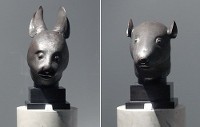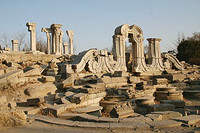***

Someone asked me what I thought of the auction of the Chinese fountainheads.
In short, I think the furore is ridiculous.
Historical and cultural properties do not belong to any one country, but broadly to humanity in general.
On a micro scale we should respect the property rights of the parties currently possessing the items (even if we are against looting today, though I think freshly dug-up items don't necessarily belong to the country on whose soil they were found - more below), but more broadly governments have no right to lay claim to artefacts.
So China claims that the fountain heads were stolen from China and should be returned, but this is very problematic.
They were stolen from a Qing Chinese palace, but their designer was actually an Italian Jesuit (Giuseppe Castiglione, aka Lang Shining). Here is a picture of the fountain in Yuanmingyuan the sculptures came from:

It would surely be a stretch to claim this is a fountain of Chinese design (in more than one sense of the word).
Is it a Chinese fountain? An Italian fountain? A Chinese-Italian fountain?
If a cure for AIDS was discovered by a PRC scientist working in a lab in a top American University working with other PRC scientists and under a PRC boss, is it an American discovery - or a Chinese discovery?
There are no easy answers here.
On another level the fountain heads were the property of a Manchurian dynasty which did not see itself as properly-Chinese (remember that Queues were imposed - on pain of decapitation - on the Han Chinese, and they were happilly lopped off in 1911). If the fountain heads dated from the early Qing period this is even more so (the Summer Palace was started in 1749, during the reign of Qianlong, and Castiglione died in 1766, so indeed it is).
Then, most Chinese people at the time hated the Manchurians and rejected them as not Chinese (see lopping off of queues; this likely exists to a lesser degree, Communist rhetoric about minorities aside), so the Chinese people of the period itself would not have accepted the fountain heads as belonging to "them" per se (though they might have viewed them as fine works of Chinese artisanry - illegitimately possessed by the scheming Manchus).
So what we have now is a retrospective grab of universal heritage.
In fact, it is more convincing to argue that the Chinese government has no right to "Chinese" heritage because it has shown itself to be manifestly unworthy guardians of it.
The Cultural Revolution, a prime candidate for the greatest orgy of cultural destruction the world has ever seen, was promulgated by the very same Chinese Communist Party that still rules China.
They thus have no right to grandstand about the looting of cultural heritage.
If you loot cultural heritage, at least you preserve it (compare the caryatid in the British Museum with her sisters in Athens - the extensive damage to the latter is both shocking and sad), whereas if you destroy it, it is gone forever.
As an analogue, the Taliban might've blown up the Bamiyan Buddhas, but the current Afghan government is different so their trotting out of the cultural sovereignty argument would have somewhat more respectability.
This is putting aside the fact that this same Communist government is still destroying its country's heritage. How many real hutongs are left? They're also trying to drown out Tibetan culture by shipping in Han migrants.
As an (admittedly imperfect) analogy, it is like trying to murder your infant child, having it taken away by a child protection agency, and then 10 years later demanding that your child be returned to you, claiming that it was illegally kidnapped (while still abusing your kids - even if you don't try to murder them anymore)
While the claim is that heritage is being reclaimed on behalf of the Chinese people, in reality it's a political ploy by a government to lay claim to artefacts, which will be put under its administration for its own benefit.
Those who are so-inclined are free to locate how many Tibetan artefacts are in Chinese museums located outside Tibet (and to look at historical maps of Chinese territory to forestall the inevitable rejoinder justifying modern Chinese imperialism).
Generalising, things become even more problematic when it comes to older cultural heritage: artefacts belonging to past peoples who, though they occupied the same geographical space, share little else in common, be it identity, language, race, religion or more.
Heritage belongs to everybody - and nobody.


